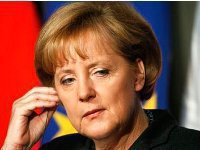The guardian angel of Angela Merkel

In Germany, elections to the Bundestag were held on Sept. 22nd. The winner, predictably, is the block of the Christian Democratic Union/Christian Social Union (CDU/CSU). The bloc surpassed its result from 2009 by 8 percent. One may confidently say that it was a personal victory for Angela Merkel, rather than for her coalition. Is the sky over Germany cloudless now?
According to Reuters, according to preliminary data of the Central Election Commission of Germany, CDU/CSU gained 42 percent of votes. "This is a super result," Merkel said to the applause of supporters. "Together, we will do everything we can to make the next four years successful for Germany." This victory is not surprising at all. The popularity of the Chancellor, who managed to guarantee the Germans relatively peaceful existence during the crisis, reached 70 percent. Merkel's government, in coalition with the Free Democratic Party (FDP), was called "the most successful government after the reunification of the country."
Germany is the largest economy in Europe, which gives up to 30 percent of total GDP in the eurozone. The unemployment rate in the country (5 percent) is the second lowest in Europe. Thanks to Merkel and her Finance Minister, Wolfgang Schaeuble, Germany managed to impose austerity and belt-tightening policy to the EU and soften the blow on the German economy. Germany avoided recession; DAX stock index is at a record high level. Germany is the third largest exporter after the United States and China. About 69 percent of exports are sent to European countries.
"Despite the crisis that affected many countries in Europe, Germany is doing well." This was the pre-election mantra of Angela Merkel and these words (and action, of course) secured her victory. Is the sky over Germany clear now?
The country is "living in illusions," says director of the German Institute for Economic Research (DIW) in Berlin, Marcel Fratzscher said. "In economic terms, we are not as good as we think," the economist told Süddeutsche Zeitung newspaper. He acknowledges that the situation is decent for an instant photo, but "in the longer term, the thesis - "things are going well" - does not correspond to reality."
According to him, about 70 percent of German workers today receive lower real wages than they did ten years ago. Compared with 1999, productivity has dropped. During the recent years, the level of investment (a part of total spending in the economy) has dropped from 20 to 17 percent. This is the main problem of Germany today, the economist believes.
The economist estimates investment deficit at 3 percent, or 80 billion euros. As a result, the country has a long-term potential for GDP growth of only one percent or the same that economists predict for Spain (recent forecasts by the European Commission speak for the increase of 0.4 percent in 2013). Fratzscher believes that Germany suffers from the lack of investment in infrastructure and education. If these 80 billion euros would be invested in the German economy, it would grow by 0.6 percent, he believes.
Yet, the European crisis costs Germany a lot. Opinion polls, including those conducted in Germany, show that people lose confidence in the EU. Finance Minister Schaeuble has repeatedly emphasized that restructuring the Greek debt was not a problem for the eurozone (read - Germany). Fratzscher shares a different view. This is another great German illusion, the economist believes. According to him, the problem should not be solved with the help of new tranches. Extending the maturity of loans and charging lower interest rates - this is the way out, he believes.
As for other results of the elections, the former coalition partner of CDU/CSU bloc - the Free Democratic Party (FDP) - lost the election to the Bundestag, receiving 4.8 percent of the vote. This is a major disappointment for Merkel, as she will now have to form a coalition either with Social Democrats (SPD ) (25.5 percent) or their "Green" allies (8 percent).
Both parties supported Merkel in the parliament on all votes related to problems of the eurozone, clearing the way for a bailout for Greece, Portugal and Ireland.
CDU/CSU declined the coalition with the "Green", so there is one option for the "grand coalition " with the SPD. There is experience in that (2005-2009), during Merkel's first term as chancellorship. This is a good development of the situation for Russia, as the portfolio of the Minister of Foreign Affairs will be given to SPD representative Frank-Walter Steinmeier, for whom relations with Russia have always been a priority.
Angela Merkel - the daughter of a Protestant pastor - grew up and was raised in East Germany. She has a doctorate in physical sciences and is an expert in the field of quantum physics. Before she became the Chancellor of Germany, she served as the Minister of Environmental Protection and Nuclear Safety. She is fluent in Russian and English. She will be the third post-war chancellor to win three terms in a row, after Konrad Adenauer and her mentor Helmut Kohl. The Constitution of the Federal Republic of Germany provides for an unlimited number of consecutive terms at the highest position.
Lyuba Lulko
Pravda.Ru
Subscribe to Pravda.Ru Telegram channel, Facebook, RSS!


